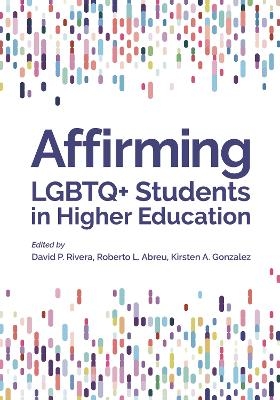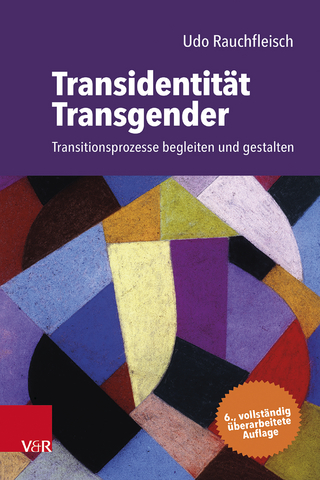
Affirming LGBTQ+ Students in Higher Education
American Psychological Association (Verlag)
978-1-4338-3308-3 (ISBN)
This book will guide institutions of higher learning in making practical and effective changes at many levels to better support LGBTQ+ students and, ultimately, improve the campus climate for all. For college students with marginalized gender identities and sexual orientations, simply getting through a day of study—not to mention work, exercise, and social life—can be taxing in the extreme, due to the additional weight of minority stress. However, there are many steps higher education leaders can take, both to boost students’ resilience and to dismantle the very structures that create minority stress. These steps may involve changes to facilities, student health and resource centers, housing, administrative policy, faculty training, curriculum, and other areas.
This book presents research-based needs assessment frameworks and best practices for integrating a broad array of institutional changes to improve LGBTQ+ students’ higher education experience. Chapters describe student populations with multiple intersecting identities: transgender students, students of color, students with disabilities, student athletes, international students, and first-generation college students. The authors also address issues unique to different settings, including community colleges, religious institutions, and historically Black colleges and universities.
David P. Rivera, PhD, is an associate professor of counselor education at Queens College-City University of New York. His professional experience includes college counseling, higher education administration, and also includes consultations and training on diversity, equity, and inclusion issues. His research is guided by critical theories and social justice frameworks, and explores cultural competency development and issues impacting the marginalization and wellbeing of people of color and oppressed sexual orientation and gender identity groups, with a focus on microaggressions. Learn more about Dr. Rivera’s work on Twitter @DavidPRivera or Instagram at riveradavidp. Roberto L. Abreu, PhD, is an assistant professor of Counseling Psychology and the director of the Collective Healing and Empowering VoicEs through Research and Engagement (¡Chévere!) in the Department of Psychology at the University of Florida (UF). Dr. Abreu’s research explores ways in which marginalized communities resist systemic oppression and promote bienestar colectivo (collective well-being), with a particular focus on Latinx communities, lesbian, gay, bisexual, transgender, and queer (LGBTQ) and the intersection of Latinx and LGBTQ people and communities. Follow Dr. Abreu’s work on Twitter at @RLuisAbreu & @ChevereLab, Instagram at cheverelab, Facebook at Cheverelab. Kirsten A. Gonzalez, PhD, is an Assistant Professor in the Department of Psychology, specializing in counseling psychology at the University of Tennessee, Knoxville (UTK). She is also a core faculty member in Women, Gender, and Sexuality studies and Latin American & Caribbean studies at UTK. Dr. Gonzalez's research and clinical interests include the psychological well-being of LGBTQ+ Black, Indigenous, and Other People of Color (BIPOC), migration experiences of Latinx community members, and allyship and social justice advocacy interventions. Follow Dr. Gonzalez on Twitter @DrKAGonzalez or Instagram @theresistlab. Learn more about Dr. Gonzalez’s work at https://resistlab.squarespace.com/
Contributors
Introduction: A Call to Action for Affirming All LGBTQ+ Students in Higher Education
Kirsten A. Gonzalez, Saumya Arora, Roberto L. Abreu, & David P. Rivera
Part I. ContextsChapter 1. Institutionalizing LGBTQ+ Student SupportAnneliese Singh
Chapter 2. Exploring the Complexities of Black Sexual and Gender Minorities in Historically Black Colleges and UniversitiesAngela Ferguson
Chapter 3. Planning and Building New Foundations: Developing Proposals for Creating LGBTQI+ Resources at Community CollegesEmalinda L. McSpadden, Leilani Massey, & Ines I. Almarante
Chapter 4. LGBTQ Students in Nonaffirming Religious InstitutionsTheresa Stueland Kay & Joshua R. Wolff
Chapter 5. One Model, Multiple Locations: The Salisbury University Safe Spaces ProgramDiane S. Illig, Michele M. Schlehofer, & Tara Taylor
Part II. Student Populations
Chapter 6. Recommendations and Advocacy Strategies for Meeting the Needs of Transgender and Nonbinary StudentsLuke R. Allen & lore m. dickey
Chapter 7. Supporting LGBTQ+ College Students Living With DisabilitiesFranco Dispenza, Merideth Ray, & Jamian S. Coleman
Chapter 8. Creating Safe Spaces for Lesbian, Gay, Bisexual, Transgender, and Queer (LGBTQ+) Student-AthletesTaylor M. McCavanagh & Michael C. Cadaret
Chapter 9. Navigating New Terrain: Sexual and Gender Diverse College Students Who Are the First in Their Families to Attend CollegeAlison Cerezo & Amaranta Ramirez
Chapter 10. Supporting Rural LGBTQ+ Communities in Higher EducationJoel D. Goodrich & Michael James McClellan
Chapter 11. Supporting LGBTQ International Students in Higher EducationNadine Nakamura, Jan E. Estrellado, & Saeromi Kim
Chapter 12. Resisting Colonization in Higher Education and Empowering LGBTQ+ Students: Mobilizing Toward LiberationRoberto L. Abreu, Saumya Arora, Kirsten A. Gonzalez, & David P. Rivera
Index
About the Editors
| Erscheinungsdatum | 31.05.2022 |
|---|---|
| Reihe/Serie | Perspectives on Sexual Orientation and Gender Diversity Series |
| Verlagsort | Washington DC |
| Sprache | englisch |
| Maße | 178 x 254 mm |
| Themenwelt | Geisteswissenschaften ► Psychologie ► Sexualität / Partnerschaft |
| Sozialwissenschaften ► Pädagogik ► Erwachsenenbildung | |
| ISBN-10 | 1-4338-3308-5 / 1433833085 |
| ISBN-13 | 978-1-4338-3308-3 / 9781433833083 |
| Zustand | Neuware |
| Informationen gemäß Produktsicherheitsverordnung (GPSR) | |
| Haben Sie eine Frage zum Produkt? |
aus dem Bereich


